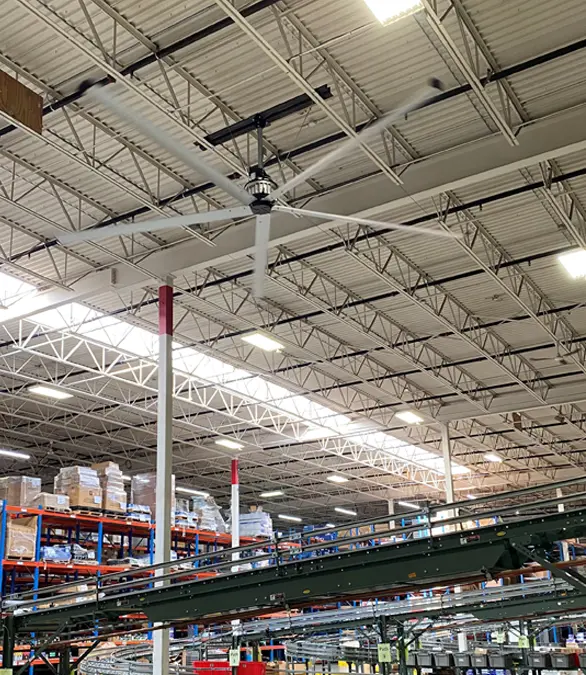
Maintaining a warehouse’s ventilation is essential to creating a healthy workplace that encourages productivity. The overall effectiveness of your warehouse, particularly with regard to ventilation, air quality, and cooling, will depend on the type of industrial fan you choose.
The Need for a Warehouse Fan
It is important to look at why a warehouse fan is needed before delving into the details of how to choose one. In large open spaces like a warehouse, the stagnant air inhibits comfort and leads to health risks among the workers. Another issue associated with improper ventilation is the storage of stock, particularly products sensitive to temperature fluctuations.
Installing an industrial fan in your warehouse has the following main advantages:
- Better Air Quality: A well-functioning warehouse fan not only improves airflow but also reduces dust and other airborne particles, which is beneficial to the workers’ health and air quality.
- Temperature Control: Industrial fans ensure that the temperature in the industrial buildings is well regulated to prevent cases of heat stress among the employees.
- Energy Efficiency: By providing conditions for the free circulation of air within the structure of the warehouse, it is possible to economize on cooling, which means that the expenditure on energy becomes efficient.
- Moisture Control: Temperature should also be closely regulated to check moisture content and ensure that mold does not develop, which could compromise your stocks.
Industrial Fan Types for Warehouse Applications
Different applications and warehouse setups call for different kinds of industrial fans. Here are some typical types to consider:
- Ceiling Fans: Large open areas, like warehouses, where air can be efficiently circulated throughout the room, are ideal for using ceiling fans. They work especially well at minimizing hot and cold patches.
- Wall-Mounted Fans: These fans work well in settings with limited floor space. Within the warehouses, they can be arranged so that they service predetermined areas.
- Floor Fans: Floor fans are a convenient and portable tool that can be positioned precisely around the warehouse to generate airflow.
- Exhaust Fans: Exhaust fans are helpful in drawing damp air out of a warehouse when dealing with pollutants, dust, or other airborne substances.
- HVLS Fans: Massive ceiling fans designed specifically to promote air circulation in big areas, HVLS fans are intended for the slow, continuous movement of large quantities of air.
Key Factors to Consider
There are some factors that one has to consider when selecting a warehouse fan. Here are some to bear in mind:
Size of the Warehouse
The amount and size of fans that need to be placed will depend on the size of the warehouse. Large industrial HVLS fans or multiple fans may be required to augment proper airflow, depending on the warehouse’s size.
Airflow Requirements
One important thing to consider is the fan’s air circulation capability, which is expressed in cubic feet per minute, or CFM. Since the CFM value represents the volume of air that the fan can move, a higher number is obviously better. Choose a fan with the adequate CFM rating for the size and location of the warehouse.
Mounting Options
The common types of fans used in warehouses based on the place of installation are ceiling fans, wall fans, and floor fans. Consider how the fan will be installed and how this will impact the airflow within the room.
Noise Levels
In a warehouse where there are numerous activities taking place, the level of noise is usually of great concern. To avoid disrupting workers or hindering communication, look for a fan that operates quietly.
Energy Efficiency
Low energy consumption from the fan can result in more reasonable operating expenses in the long run. Choose fans that have high energy efficiency ratings and, if possible, those with programmable or reversible speed options.
Sturdiness and Maintenance
Industrial fans ought to be robust enough to survive the conditions found in warehouses. Consider fans constructed of durable materials that need little maintenance.
Safety Aspects
Make sure the fan you select has all the required safety measures, like guards and an automated shut-off in the event that it overheats.
Making the Right Decision
With these considerations in mind, you’ll be better able to select the appropriate warehouse fan. Here’s a step-by-step tutorial to assist you in choosing:
- Analyze Your Needs: Begin by determining the particular requirements for your warehouse. Think about the dimensions, arrangement, and any specific sections that need directional ventilation.
- Investigate and Compare: Explore the features and types of fans available. Examine their CFM ratings, energy efficiency, noise levels, and other features.
- Consult Professionals: You can speak with specialists or industrial fan vendors if you’re unsure. They will have the experience to assist you in identifying the best course of action.
- Consider Long-Term Costs: In addition to the original investment, there are numerous other long-term running costs to account for. Although energy-efficient fans may cost more initially, they can save you money in the long run.
- Test & Assess: Try the fan out in your warehouse setting if you can to see how it works. Ensure that it operates quietly and effectively, meeting your ventilation needs.
Conclusion
Making the proper industrial fan choice for your warehouse can have a significant impact on energy expenses, worker comfort, and operational efficiency.
Invest in the right warehouse fan with Refresh Fans. Our industrial fans offer excellent airflow, energy economy, and durability. For a free quote, give us a call at 1-866-450-3498.